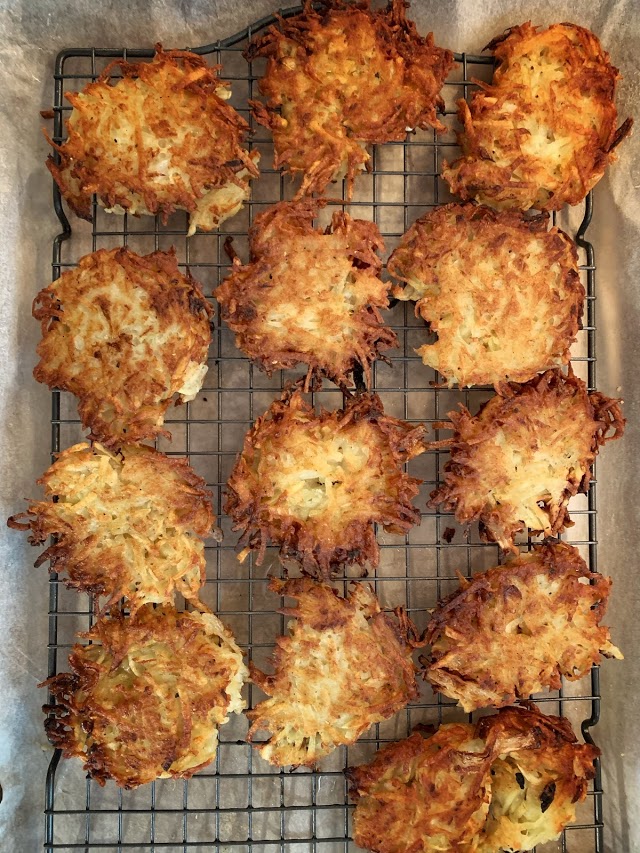I have always loved potato latkes. My first experience of eating these delicious potato pancakes- latke is Yiddish for pancake– was at Nate’s Delicatessen in Ottawa while visiting my sister Lesley in the early 70’s. I loved the latkes so much, that I once put in a request to Lesley’s friend Michael, who was travelling back to our home town of Thunder Bay, to please bring me an order of latkes from Nate’s. And he did. On the plane. Tucked carefully in the overhead bin. They reheated beautifully!
Not growing up in a Jewish household, we didn’t celebrate Hanukkah, so latkes aren’t part of my family’s culinary traditions. Or, at least, they weren’t when I was growing up. For years, I have made latkes in honour of my friends who do celebrate Hanukkah. Well, and because I love them, too! But for me, food is not just about the taste. It’s about the history, traditions and cultures to which it is attached. All food tells a story and the latke has a rich story to tell with many different approaches to its preparation.
This year I did a little research to try and see if there was a better recipe out there than the method I had been following in the past. As you can imagine, there are a lot! Some call for grating the potato and onion into ice water. You must squeeze the juice out of the potato and onion through muslin, not a tea towel. All recipes include the addition of dried potato starch, flour or matzoh meal. Others insist that incorporating the natural starch that results from grating the potatoes is best. Some recommend using a box grater, while others the grating disk on a food processor. You must add schmaltz – rendered chicken fat- to the oil. You must use a neutral-tasting oil. The fat is the important part. The type of potato is the key. Russet versus Yukon Gold. Peeled, not peeled. My head was spinning.
In the end, I settled on a melange of a couple of recipes from the celebrated Canadian cookbook author and culinary journalist, Lucy Waverman. Lucy creates recipes that are always dependable, so I was confident of an excellent result. She doesn’t suggest the incorporation of schmaltz, but I wanted to try it. Schmaltz isn’t a big seller in my little mountain town, but I did find some Brome Lake Duck Fat at my favourite grocery store and used a little of that.
The latkes were, if I do say so myself, my best ever! Latkes are traditionally served with sour cream or applesauce. I am afraid I opted for the straight from the pan, nothing else required, approach. If there are any left, we may go the sour cream route!
Lucy Waverman’s Potato Latkes for Hanukkah… mildly revised
3 large russet potatoes, peeled (about 2 pounds)
1 large onion
1 tablespoon potato starch or the starch from the grated potatoes
2 tablespoons flour
1 beaten egg
Salt and pepper
Grate the potatoes and onion in a food processor or using a box grater. Place in cheesecloth and wring out all of the juice into a bowl. Place the grated potatoes and onion in another bowl. Drain off the remaining liquid in the first bowl, reserving the potato starch that rests in the bottom. Add it to the potatoes and onions. If you want to skip this step, just add a tablespoon of potato starch. Stir in the flour, beaten egg and salt and pepper.
Heat a thin layer of oil in a large skillet, preferably cast iron. Now, this is where I deviate… you may add schmaltz, or in my case, duck fat, to the pan with the oil. When the fat is hot, place a heaping spoonful of the latke mixture in the pan and press down. Continue with three or four more, depending on the size of your pan. Cook until nicely browned and crispy on one side and flip. Repeat with the other side. Once both sides are done, transfer to a cooling rack or paper towels. You may need to add more fat or oil as you go along.
The real challenge here is waiting long enough to taste them so that you don’t burn the roof of your mouth!
Happy Hanukkah, everyone!

4 Comments